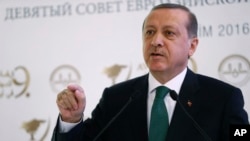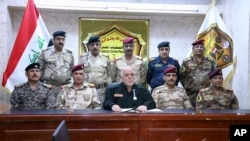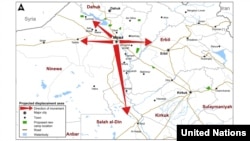With Iraqi-led forces starting their operation to recapture the city of Mosul from Islamic State militants, diplomatic tensions have erupted again between Baghdad and Ankara over the operation.
Warning about dangers of ethnic cleansing, Turkish President Recep Tayyip Erdogan launched a verbal salvo against Baghdad, demanding a role in the offensive.
Why should Turkey not enter Mosul, Erdogan asked, arguing that his country has a 350-kilometer border with Iraq, and pointing to the fact that others who have nothing to do with the region are entering the city.
Ankara has a force of around 700 soldiers supported by dozens of tanks at the Bashiqa base close to Mosul. The force was set up ostensibly for training Sunni militia to fight IS.
Baghdad has ruled out any Turkish role and called for the removal of the Turkish forces from Bashiqa, warning they could be targeted.
Sinan Ulgen, a visiting scholar at Carnegie Europe in Brussels, says the dispute is about the nature of the forces involved in the Mosul offensive.
"I do not think it is realistic the Turkish military will intervene in Mosul. It is more a matter whether the different ethnic groups backed by Turkey will be the main force driving towards Mosul and capturing the city, rather than the Baghdad-backed and Iran-backed Shia militia," Ulgen said.
Local media reports a Turkish Foreign Ministry delegation is to hold talks in Baghdad. Turkey’s military chief, Hulusi Akar, met on Sunday with his U.S. counterparts in Washington to discuss the Mosul operation and other issues.
The sectarian factor
Ankara is already claiming success, saying 1,500 members of the Sunni forces it trained in Bashiqa will be in the forefront of efforts to liberate Mosul.
The deputy head of the Ankara based Turkish Asian Center for Strategic Studies, Murat Bilhan, says Turkey's chief concern is the risk of sectarian tensions.
"The Shi'ite regime in Baghdad wants to cooperate with the Iranians to take over Mosul and to turn it into a Shi'ite stronghold. It is unacceptable for the original residents of Mosul, which will be just evicted and pushed towards the north, again another flow of refugees to Turkey and so forth. This is unacceptable," Bilhan said.
Aid agencies and the United Nations have warned efforts to retake Mosul could result in hundreds of thousands of refugees. Turkey is already hosting nearly three million refugees from Iraq and Syria.
Turkish government spokesman Numan Kurtulmus says Ankara will make sure ethnic politics do not dominate Mosul.
Ulgen says the prospect of an IS defeat is opening a growing power struggle.
"Who gets to control the territories that are going to be freed by the Islamic State, and... there is definitely a game of influence between Iran-backed members of the IS opposition as opposed to Turkey-backed members of the opposition, the Kurdish peshmerga, some of the Sunni Arab factions and the Turkmen," Ulgen said.
Turkish media report Iraqi Turkmen in the Mosul region are calling for autonomy. Observers warn as regional ethnic and sectarian rivalries grow, similar calls are also likely to grow.
Erdogan has done little to allay Iraqi concerns, ruling out any withdrawal of Turkish forces from Iraq and declaring his country will play a role in any negotiation over Mosul's future.













